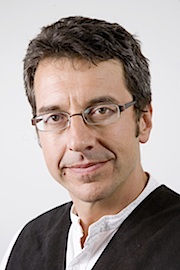REWILDING AND IT’S IMPACT ON FOOD SECURITY
BY SIMON FAIRLIE
This article is focused on a proposal that George Monbiot, an English writer known for his environmental and political activism as well as a citizen from the country of Wales, on putting a halt on the raising of sheep in the uplands. The reason for this is because he saw that the country would actually be sacrificing very little if they gave up their sheep raising ways and instead turned on other forms of sustaining themselves, such as rewilding which would replace the need for sheep by supplying an economy in the form of tourism. The sheep was not seen as a completely negative form of life, Monbiot did acknowledge the many benefits that having livestock, specifically sheep could have for a region. Some of the benefits he mentions in the form of raising sheep is their ability to provide a meat source, wool, allowing sunlight by keeping vegetation levels low, and providing fertilizer for pieces of lands that would otherwise be useless. Unfortunately he feels that times have changed and the commodities that a sheep population provide are no longer required, due to more advanced methods of retrieving those commodities being developed.
In the piece he also notes the potential negative sides that can come from rewilding of farms, which involve completely shutting out the farmers to allow nature to retake the land. The impact that he saw from such action is with a decrease in local farmers, the country would still have to find it’s supply of meats somewhere else. This would require Wales to import mass amounts of meat into the country from outside sources. To do this would require an intense amount of fossil fuels, it would interfere with their local economy because the meat is being outsourced, and with more international business more infrastructures would have to be built to accommodate such a process.
Initially reading into the piece I thought he was an advocate for the complete rewilding movement, but later Monbiot presents an idea that puts a spin on rewilding listing out the detrimental effects it could have outside the borders of the rewilded region. Monbiot concludes with the thought that rewilding should be seen as this mentaility of “spare not share”, which I found extremely interesting. In opposition of Jimmy Bryan the successful farmer (Link to stuff about him) who was able to share his Mississippi farm, while still maintaining production, Monbiot feels that, along with director of the Hudson Institute’s food policy director Dennis Avery, that the world should be placed into zones. One where the most efficient and highly productive means of farming be done to basically power out as much produce as possible. This in turn by the belief of these two gentleman, will allow for sufficient amounts of food while also sparing other regions to be left intact to remain as wilderness and solely wilderness, left to grow and manage on it’s own doing.
Though not the most heartwarming piece on rewilding I felt like this piece really brought to light the realities a region like Vermont would face if the rewilding movement were to be in place. Vermont being the organic state that it is, is highly involved in producing as much of it’s own food supply as possible. This article brings to light the reality rewilding would have on the food supply of Vermont, it brings an eery realization that the rewilding of one location could result the “dewilding” of another location, in response to meet food demands in the rewilded location. I felt like this wasn’t a complete negative towards rewilding, but more of a consideration when the notion of rewilding comes up, it seems the process is more location based, forcing those that want to perform a rewilding to reflect back on the amount of commodities that not only they, but also their consumers, rely on coming from their agricultural operations. We see that in some cases such as Jimmy Bryan, bridging agriculture and wildlife is possible in a beneficial manner, but for some regions such as Wales, it may require much larger considerations as well as sacrifice.
TED TALK BY GEORGE MONBIOT HIMSELF, HERE HE DEMONSTRATES HIS SUPPORT OF THE REWILDING MOVEMENT
-John Truong
